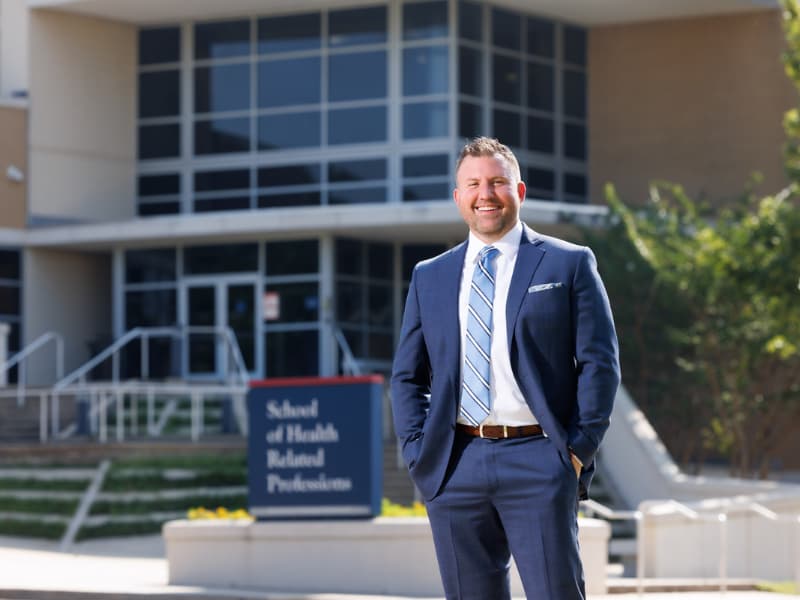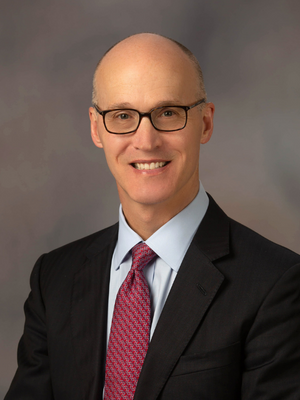Garner ready to pitch perfect programs as new SHRP dean

Dr. Jay Garner’s path to his new job has been as varied as the array of programs he’s now tasked with overseeing on a daily basis.
A native of Brookhaven, Garner, 43, played several sports in school, including high school where he was valedictorian, and at Delta State University, where he was an All-American and Academic All-American pitcher on the baseball team. But, coming out of college, he faced the same dilemma many student-athletes face – how to spend the rest of his working life after the games are over.
“I was not the typical athlete through and through,” he said. “I always knew there was more after sports, but was not exactly sure what that was.”
Garner eventually found his path, earning a PhD in biomechanics at Auburn University, which led to his first return home, at the University of Mississippi, where he taught and served as the director of the applied biomechanics laboratory for nine years in the Department of Health, Exercise Science and Recreation Management, and also served as department chair his final three years.
“I had a few available options, including minor league baseball and med school, but neither seemed like the ’right‘ route. Even when I got to Auburn, as I completed the lab work for my master’s thesis doing lipid metabolism, I realized the bench sciences and working with blood lipids and lipoproteins was not the long-term avenue for me,” Garner said.
He thought back to his rehab from sports injuries and found a different way into a career in all things athletics besides playing competitive sports.
“While injured, I spent a lot of time with an orthopaedic surgeon now at Tulane and with my athletic trainer at DSU,” he said. “Independently, they steered me in a direction that was different, and a little unknown to me at the time. It got me to look at the preventive aspect of sports medicine and performance.
“I got into a biomechanics class at Auburn and really fell in love with the mechanical engineering side of human movement. The researchers I got to work with delved into those with injuries in sports and in other occupations. Athletes aren’t just on the playing field. They’re in occupational settings, too, such as first responders and military, and even in the arts.”
Garner’s second return home is as the fifth dean of the School of Health Related Professions, a role he assumed officially May 30. Dr. Angela Burrell served as interim dean following the retirement of nine-year dean Dr. Jessica Bailey in 2022. Burrell now chairs the school’s Doctor of Health Administration program.
He previously worked for seven years at Troy University in Alabama, where he first served as chair of the Department of Kinesiology and Health Promotion and then as dean of the College of Health & Human Services.

“We are delighted to have Dr. Garner back in Mississippi as our SHRP dean,” said Dr. Scott Rodgers, associate vice chancellor for academic affairs. “He brings with him a wealth of leadership experience and wisdom. We feel confident he will build upon the excellence of SHRP and its stellar reputation in the health care workforce.”
Garner’s research activity has covered sports equipment, human movement, concussions, accidents in the workforce and medical devices, among other topics. It’s professional experience that, at multiple points in his life, he didn’t predict he’d ever have, much less tout on a job application.
“Growing up, my dad served several roles in the Brookhaven school district’s administrative offices and later became superintendent in Louisville, and my mom was a teacher,” he said. “I once swore I would be neither a teacher nor an academic administrator. But some things are in your blood, right?”
That academic administrative bloodline led to several leadership training opportunities and numerous teaching awards throughout his career, which should serve him well in managing SHRP’s offerings in the allied health fields of study.
SHRP’s 12 baccalaureate, master’s and doctoral programs range from fields related to Garner’s own hands-on background in exercise science, such as physical therapy and occupational therapy, to more highly technical areas of health care such as nuclear medicine and histotechnology. Keeping those programs viable to fill the health care workforce in Mississippi and beyond depends on a consistent dose of checkups, he said.
“The old saying about maintaining and developing relationships has never been more true for our school,” he said. “There’s a need for our programs, most of which are very specialized, to be connected to entities not just across campus but across the state in order to best serve Mississippi. It will be about getting the information out about what you can do with these degrees, how you can expand your existing career and how you can be a part of improving the health of Mississippi. I’m excited about reconnecting with previous colleagues, meeting new ones and developing fruitful relationships with students, faculty and industries across the state.”
On campus, he’s already made inroads with students on that same score.
“Right off the bat, I was impressed with his desire to listen to each student in the room for a town hall he had several months ago,” said Walker Hardin, a Doctor of Physical Therapy student and SHRP Student Government president. “He wanted to understand SHRP from our perspective, and he listened to our thoughts before beginning to share some of his plans for the direction of the school and its various programs.”
Doing business amid ever-rising equipment costs and warp-speed changes in technology is a changing strike zone, of sorts, for both SHRP and the assorted industries the school functions to fill with its graduates. Preparing students for those changes is pretty much imperative, he said.
“We’d love an unlimited budget, but we understand the world we live in. Technology changes every day, and technology isn’t cheap. It’s our goal to make sure the money is stewarded appropriately to help students and faculty navigate those changes.
“We also want to work with the Office of Development to find new opportunities and funding streams. We do a great job disseminating knowledge to our students, but also want to help generate new knowledge, techniques and revenue through a teacher scholar model. My leadership will always focus on student preparation, faculty resources and community engagement.”
A fourth could be adaptability, as Garner notes many tech-heavy jobs in the health sciences continue to evolve faster than schools can reasonably prepare students.
“A vast number of jobs available for today’s graduates haven’t even been created yet,” he said. “If we look at fields that are tech-driven, we see today’s technology is the basis for tomorrow’s normal work day. But, doors are opened here for students to get into fields not even developed yet.”
One example, he said, is in relation to the prevalence of artificial intelligence in the health care workplace.
“We see where AI can influence the decisions made in all fields related to this school, especially in the information and imaging areas,” he said. “It is already used in many ways, but will continue to increase in prevalence in diagnostic and predictive capabilities. It is the future for some of these fields. However, many of our programs still have patient interaction components to it, so the human touch is always going to be a piece of it. We’ll put our students in the best position to see, feel and experience what they’ll be expected to do in a real-world job situation and not have to learn a completely new field when they enter the workforce.”
In the interim, Garner says he’ll aim to make the sheer range of programs available through SHRP an asset when it comes to workforce development.
“We have the ability to assist, improve and work many different avenues,” he said. “It’s such a diverse school with so many different opportunities to make an impact. Each of our programs can positively influence the health of Mississippi.”


